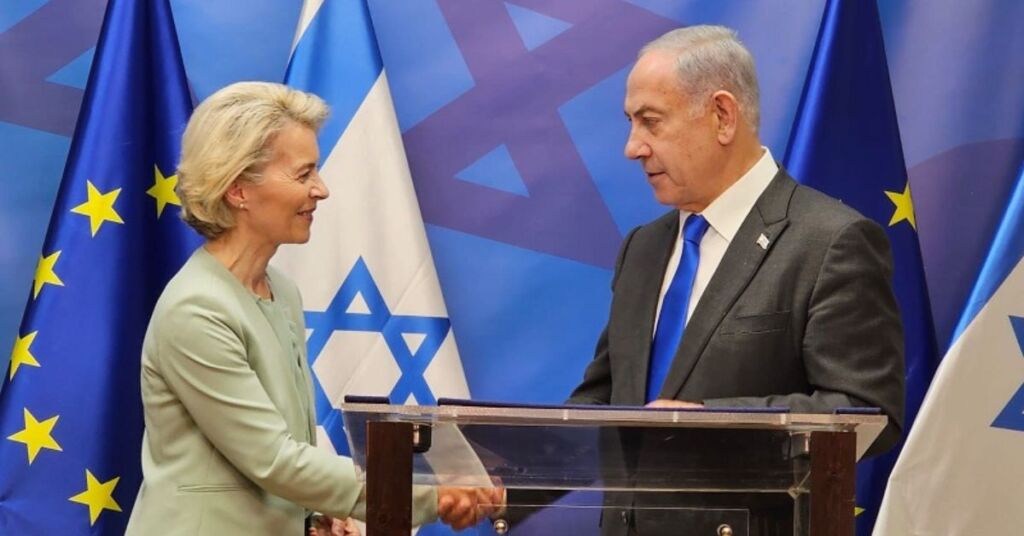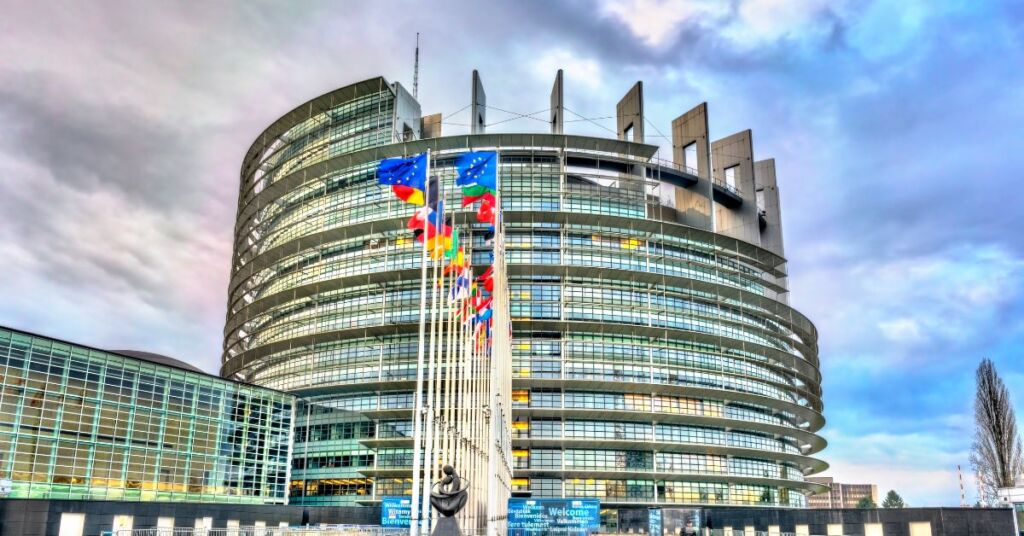The EU-Israel Agreement Is Being Reviewed – But Will That Mean Anything?

With over 50,000 Palestinians dead, countless others still trapped beneath the rubble, 90% of Gaza’s population displaced, and more than 14,000 babies on the brink of starvation due to Israel’s near-total blockade of the Strip over the past three months, the European Union has finally begun to act.
After months of silence, vague condemnations, and diplomatic hedging, the bloc is now making its first real move: announcing a review of its trade and cooperation agreement with Israel. Apparently, it took the looming mass starvation of thousands of infants for the EU to draw a line.
It may not seem like much – but so far, it’s the EU’s strongest and most concrete response to Israel’s war in Gaza and its ongoing violations of international law
So, let’s break down what this agreement entails and why it’s being reviewed.
EU-Israel Association agreement
Signed in 1995 and in force since June 2000, the EU-Israel Association Agreement forms the legal foundation for political, economic, and trade relations between the two sides.
Israel was the first non-European country to establish formal ties with the European Economic Community (EEC), the EU’s predecessor, back in 1959. Their first cooperation agreement came in 1975 and focused largely on trade.
Throughout the 1980s, economic ties grew, though broader cooperation remained limited — ironically, due in part to European support for Palestinian self-determination.
That began to shift after the 1993 Oslo Accords between Israel and the Palestinian Liberation Organisation, which prompted the EU to deepen its political and economic engagement with Israel.
In 1995, alongside the launch of the Euro-Mediterranean Partnership (also known as the Barcelona Process), the EU and Israel signed the Association Agreement in Brussels. It replaced earlier trade deals and introduced free trade in industrial goods, joint work on research, customs, transport, and environmental issues, as well as regular political dialogue and formal commitments to human rights and democracy. It also established the EU-Israel Association Council to oversee the relationship.
The agreement came into effect on 1st June 2000, marking a significant step forward in bilateral ties — economically and politically.
Crucially, Article 2 of the agreement states that all provisions must be based on “respect for human rights and democratic principles.”
And this is where the contradictions begin.
Reviewing the agreement

Netanyahu meets Ursula von der Leyen a week after 7th October attacks. Photo: GPO
The forced starvation of two million people is, unsurprisingly, a violation of human rights — as are the bombings of hospitals, schools, refugee camps, and homes.
In response, 17 out of 27 EU member states have now backed a proposal to review the EU-Israel Association Agreement.
Malta was among those supporting the Dutch-led initiative. The EU executive will now assess whether Israel has breached its obligations under Article 2, which commits both parties to uphold human rights and democratic principles.
Until last week, however, the EU had remained deeply divided on how to respond to the Israel-Hamas war.
Spain and Ireland had already called for a review 15 months ago in a letter to Commission President Ursula von der Leyen — a letter that remains unanswered, even as evidence of international law violations continued to mount.
Similar demands began gaining traction within the European Parliament last November, when 48 MEPs urged the suspension of the agreement. At the time, PL MEP Alex Agius Saliba told Lovin Malta that only a small minority in Parliament were pushing for a ceasefire or applying real pressure on Israel. His remarks reflected the general posture of most EU governments — cautious and largely limited to tepid calls for a conditional truce.
Later that month, former EU High Representative Josep Borrell floated the idea of suspending ties altogether. This prompted a closed-door meeting between the Israeli foreign minister and EU counterparts. But with a temporary ceasefire in place, talk of Article 2 was quietly set aside.
This week marked a shift. The prospect of mass starvation in Gaza appears to have been the tipping point — pushing the EU from paralysis to at least a hesitant step forward.
During a fresh debate between the European Commission and Parliament, several MEPs argued that merely reviewing the agreement was too little, too late. Calls grew to suspend it outright.
It’s worth noting that starvation was already killing thousands in Gaza well before the current three-month aid blockade.
Meanwhile, the UK, France, and Canada have also begun threatening sanctions if Israel doesn’t lift its siege and allow humanitarian aid through.
The possible outcomes

Once the review is complete, the EU faces a range of options — from symbolic gestures to meaningful diplomatic action.
One possible outcome is that the EU concludes Israel hasn’t violated Article 2 to a degree warranting intervention. Such a verdict would not only legitimise Israel’s devastating campaign in Gaza but also deliver a fresh blow to the EU’s already fraying credibility. It would suggest that even mass displacement, starvation, and indiscriminate bombing fall short of crossing Europe’s red lines.
Another likely scenario is a formal statement of concern — strongly worded, but ultimately toothless. This would leave the agreement intact while offering just enough condemnation to paper over internal divisions. It would also reflect the EU’s track record so far: cautious, fragmented, and largely ineffective.
A more substantive response could involve suspending specific parts of the agreement. The EU might target trade preferences for Israeli goods, pause high-level political meetings, or freeze certain funding mechanisms. This would allow Brussels to invoke the agreement’s human rights clause without fully severing ties.
Then there’s the nuclear option: a full suspension of the EU-Israel Association Agreement. That’s what several MEPs are demanding — but it remains highly unlikely. Such a move would require unanimous support from all 27 member states, a consensus that has proved elusive.
Still, the EU has taken this route before. It has suspended agreements with countries like Zimbabwe, Syria, Belarus, Fiji, and Russia over abuses ranging from election fraud to military crackdowns and foreign invasions.
A less dramatic path might see the EU link future cooperation or funding to measurable improvements in Israel’s human rights record — potentially with new monitoring mechanisms or a revised framework agreement.
Will it make a difference?

Malnourished child in Gaza. Ali Jadallah/Anadolu via Getty Images
Announcing the review is a step forward — but it raises more questions than answers. After 19 months of inaction, diplomatic platitudes, and tepid condemnation, the EU’s sudden shift feels less like a moral awakening and more like a belated response to pressure it can no longer ignore.
Yes, mass starvation is horrifying. But it’s hardly the first horror. The systematic bombing of civilian infrastructure, the killing of journalists, the flattening of entire neighbourhoods — all of this has unfolded in plain view, and for the most part, EU leaders have let it happen.
So why now?
The timing is telling. A narrative that once backed Israel’s campaign almost unquestioningly is now changing — fast. Whether this is a reaction to public outrage reaching a breaking point, or a more strategic repositioning in anticipation of a second Trump presidency, many EU voices that were silent for months are suddenly finding urgency.
Still, the review alone is not enough. Words and process mean little without consequences. And too often, the EU has defaulted to symbolic gestures while continuing to arm, fund, and coordinate with Israel behind the scenes. Many of the same states calling for accountability are still supplying weapons, surveillance technology, and intelligence that enable Israel’s campaign.
If this review is to carry any meaning, it must be followed by action. That means consequences, not just concern. Until then, this moment risks being remembered not as a turning point — but as yet another diplomatic performance in the face of mass suffering.
